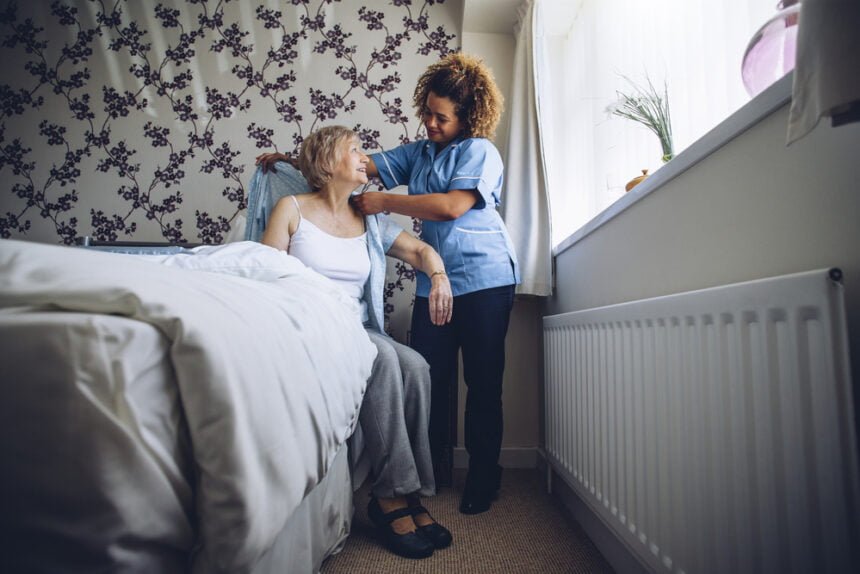A hospital bed is integral to home care for people with various medical needs. For those living with long-term illnesses or disabilities, having a hospital bed at home can help them to remain comfortable and safe.
The adjustable features of a hospital bed allow for easy maneuvering, the perfect support, and the ability to change positions without too much effort. This helps individuals maintain good physical condition by relieving pressure and reducing fatigue through movements like sitting up or standing.
Moreover, this bed type is designed to assist patients with mobility issues and help them perform activities such as dressing, eating, and bathing more easily. Hospital beds also provide secure fixation points that make transferring from one area of the house to another significantly simpler.
Finally, hospital beds are often equipped with safety features that can help prevent falls or self-injury, such as side rails and adjustable heights. These features provide a sense of security and peace of mind for the patient and their family.
Everything You Need To Know About Hospital Beds
About 5 million Americans require a hospital bed to care for their medical needs, and many factors should be considered when selecting one. If you want top-quality products, you can view a variety of hospital beds on Sondercare website to ensure your loved ones stay safe, comfortable, and independent.
When selecting a hospital bed, it’s important to consider the unique needs of your loved one. It’s also essential to discuss any safety concerns with your healthcare provider before making a purchase. Here is everything you need to know about hospital beds:
- Types of Hospital Beds – Several hospital beds are available, including manual, semi-electric, fully electric, and bariatric models.
- Adjustable Features – Most hospital beds come equipped with adjustable features like height, head and foot angles, and position control for comfort and convenience.
- Bed Rails – Bed rails provide extra safety and security by helping to prevent falls or injury from self-lifting or rolling out of bed.
- Mattress Choices – It’s essential to choose the right type and size of mattress for your bed. Some common choices include foam, air-filled, alternating pressure, and gel mattresses to provide optimum comfort and support.
Although purchasing a hospital bed can be expensive, it’s an invaluable tool that can help make life at home much safer and more comfortable for those with medical needs.
The Known Benefits Of Having Hospital Beds In Home Care Facilities
Home care facilities such as nursing homes and assisted living can benefit significantly from having hospital beds. These adjustable beds are designed to provide comfort, support, and safety for patients needing medical care while also allowing them to move freely if they’re able.
Here are some of the main benefits of having hospital beds in home care facilities:
Pressure Relief
Hospital beds provide pressure relief by adjusting the angle and position of the bed to reduce areas that become sore or painful due to lying still for a long period. This helps improve circulation, reduce the risk of infection, and allow individuals to remain comfortable throughout treatments.
For instance, people with bed sores can benefit immensely from an adjustable bed as it helps reduce skin pressure and improve healing.
Supportive Positioning
With adjustable features such as head and foot angles, patients can find a comfortable position that helps to relieve pain and provide support for different parts of the body. Imagine how helpful this could be for a patient with difficulty breathing while lying flat on their back.
Some of the most recommended sleeping positions for medical conditions such as respiratory issues, acid reflux, and scoliosis can be easily achieved by adjusting a hospital bed.
Mobility Assistance
Hospital beds make it easier for individuals with mobility issues to get out of bed and move around without too much effort. This also reduces strain on caregivers as they help patients change positions or move from one room to another.
Caregivers also benefit from adjustable features such as height and position control, which can be used to make it easier for patients to transfer in and out of beds.
For example, a caregiver can lower the bed to a safe height for wheelchair access, making it much easier for someone with reduced mobility to move around their home.
Safety Features
Hospital beds have safety features such as side rails and adjustable heights, which can help prevent falls or self-injury. These features provide peace of mind for the patient and their family members.
The most common injuries associated with elderly people in hospital beds are due to falls, so having the right safety features in place can go a long way in helping to reduce the number of such incidents.
Sleep Comfort
Quality sleep is as essential for physical and mental well-being as food and exercise. Unfortunately, many patients in home care facilities have difficulty sleeping due to poor posture or inadequate support.
Hospital beds are designed with sleep comfort in mind, providing a range of adjustable features that can be used to create the optimal posture for comfortable sleep. This helps improve overall health and well-being by allowing individuals to get the rest they need.
Final Words
Hospital beds are not just for those in hospitals. They are an invaluable tool for home care facilities, providing many benefits that can help make life much more comfortable and safer for patients.
With features such as adjustable heights, pressure relief systems, supportive positioning, mobility assistance, and safety features, hospital beds are designed to meet each patient’s individual needs and help them receive the best care possible.

